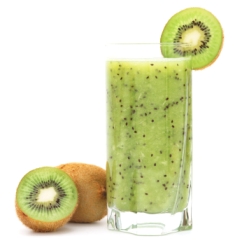Pectin Found in Kiwifruit May Give Prebiotic Advantage

Kiwifruit, a world favorite, is now being seen as one of the leading “super foods” around because of myriad of health benefits, including its prebiotic potential and anti-cancer potential.
In a recently published Journal of Functional Foods, researchers from the NZ Institute of Plant and Food Research claim that pectin that has been derived from kiwifruit may help improve the levels of good bacteria in the digestive tract.
The humble pectin… was actually a health superstar!
The same pectins (the researchers found a total of six varieties of pectin in the species Actinidia deliciosa) the study says, may also help protect the good bacteria as they flourish in the digestive tract. A growing body of studies suggest that the once humble pectin (usually used as a gelling agent for fruit jams and as material for encapsulating supplements and drugs) can provide the following benefits:
- Better digestion with pectin’s natural fiber content
- Prebiotics
- Increased heart health with its capacity to lower LDL (low density lipoproteins) or “bad cholesterol”
Compared to inulin fiber, the pectins from kiwifruit showed an enhanced effect on the good bacterias Lactobacillus rhamnosus and Bifidobacterium bifidum. The pectins also helped the body fend off bacterial invasions by lessening the adhesion of bad bacteria like Salmonella typhimurium.
Prebiotics?
The majority of health-inclined individuals around the world know of prebiotics. But how about prebiotics? What do they do?
Probiotics are compounds that encourage the growth and flourishing of good bacteria or essential bacteria in the digestive tract. They directly contribute to the growth of the organisms in the intestinal flora.
Prebiotics on the other hand, protect the bacterial growth in the intestinal flora. Since prebiotics are non-digestible substances they can also help carry away waste from the intestines. Prebiotics are also important because they prolong the life of good bacteria and they also keep the bacteria healthy.
Other benefits of prebiotics include:
- May help ease the symptoms of diarrhea caused by taking antibiotics
- Also helps people suffering from traveler’s diarrhea.
- Helps reduce the pain and inflammation associated with gastroenteritis.
- Helps normalize and regulate bowel function.
- May help improve colitis
- Can help reduce the incidence of irritable bowel problems.
- Helps the body absorb calcium
- Can help strengthen the immune system
Natural sources of prebiotics include:
- Whole grain products
- Leguminous foods
- Onions
- Fresh honey
- Fresh and cooked greens
- Garlic
- Yogurt, milk and other dairy products
- Different types of berries
- Bananas
- Apple cider vinegar (raw, not cooked)
- Jerusalem artichokes
- Other grains (gluten-free)
Amazing benefits of kiwifruit
Does kiwifruit offer other benefits other than prebiotics? Yes! Here are some of the main benefits of getting your healthy dose of kiwifruit everyday:
1. Kiwifruit is rich in vitamins and minerals, including ascorbic acid (vitamin C – one kiwifruit has more vitamin C than a regular orange), beta carotene and potassium. Potassium is brain food that increases one’s alertness and also improves one’s memory.
2. According to research performed in Italy, kiwifruit can also help improve the health of the respiratory tract. Seven portions of the fruit every week can yield respiratory benefits (respondents, children aged six to seven, showed less wheezing and shortness of breath compared to other respondents who received little or no kiwifruit throughout the testing period)
3. Kiwifruit can also help ward off the effects of age-related macular degeneration.
4. Kiwifruit is a potent source of natural antioxidants, which can help reduce the incidence of certain types of cancer, heart disease and can also improve one’s vision.
5. Kiwifruit is a natural source of soluble fiber, which improves the digestive function and also helps transport human waste more efficiently.
6. Kiwifruit may be helpful in reducing harmful mutations or changes to one’s DNA. This is important in keeping your DNA pristine for the next generation (your children, who will be receiving your DNA – and all that comes with it, including risks to certain types of diseases, etc.)
7. Kiwifruit, because of its high soluble fiber content, can help individuals with insulin-dependent diabetes (or type-2 diabetes) and people with high cholesterol. Natural fiber has been known to control blood glucose levels and bad cholesterol levels.
8. Also due to its high fiber content, kiwifruit may also help prevent deadly colon cancer.
9. Kiwifruit is a natural source of the nutrient inositol. Recent studies show that inositol is very beneficial as a supportive treatment for depression.
10. It contains the compound arginine, which is capable of dilating or opening up constricted blood vessels. As such, it is not only good for people with hypertension but is also very beneficial for males suffering from impotence or erectile dysfunction. Arginine has been long used for the treatment of impotence in males.
11. In China, a study made use of kiwifruit to see whether Chinese athletes can last longer during the rigorous physical exertion during training. With the addition of five percent carbohydrates to kiwi juice, the athletes were able to last longer – their blood glucose levels remained stable after taking the kiwi juice.
12. Amazingly, this small fruit also has a high percentage of the natural brain chemical serotonin. This compound has a relaxing effect when utilized by the body.
Kiwifruit is a type of fruit that provides the best ratio of calories to fiber & essential nutrients.
Sources:
foodnavigator.com
nutrition.about.com
mayoclinic.com
bodyecology.com
kiwi-fruit.info
whfoods.com
calharvest.com
bimuno.com
Related Posts
- Cranberry Helps Cure Urinary Tract Infection, US Study Says
- Beta-Glucan Shows Promise as Probiotic Agent
 
|
Enjoy this article? We guarantee your privacy. Your email address will NEVER be rented, traded or sold. |
Visit my new site: Self Help On The Web
 |
 |
Posted: June 13th, 2010 under Probiotics.
Tags: Actinidia deliciosa, Adult-onset diabetes, age related macular degeneration, arginine, benefits of kiwifruit, blood glucose level, Cancer, Depression, fiber, Heart Disease, inositol, inulin, kiwifruit, pectin, prebiotics, Probiotics, serotonin, soluble fiber, type-2 diabetes






